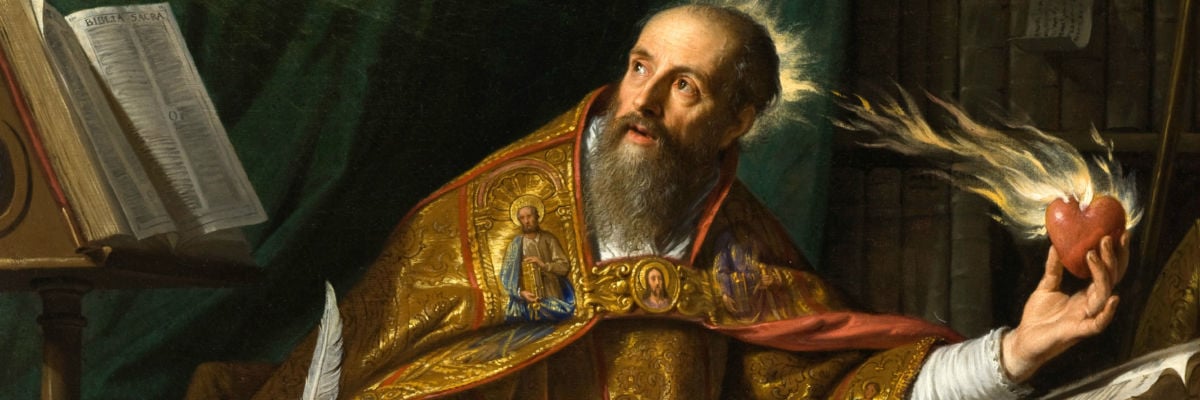
A powerful argument for staying close to the Catholic faith is the beauty of the Church’s calendar of feasts and fasts. That the feast days of St. Monica and her son, St. Augustine, are back-to-back on our calendar beautifully reminds us of the transforming graces of humble, prayerful Catholic parents. Augustine candidly wrote about his mother’s routine insistence that her young son embrace Catholic faith. The bishop was right when he told a tearful Monica: “It cannot be that the son of these tears should be lost” (Confessions 3,12).
In a striking scene, Augustine describes a conversation with his mother, days before her death, standing on a balcony. Monica, a great woman of faith and Augustine, the relentless thinker, ascend in conversation to a joint mystical encounter with God’s eternity, seeing the vast range of creatures radiating with the divine presence. Their joint vision poetically speaks of the harmony of faith and reason.
For those who have a special passion to defend the Catholic faith, Augustine’s many writings provide an unparalleled and enduring treasure trove of insights and wisdom. There is hardly an area of Catholic faith to which he did not contribute some enduring insight.
Augustine’s most deeply personal and transforming insight deserves special attention from those who seek to cultivate their intellectual gifts in the service of the Catholic faith.
In Confessions, his extended, soul-searching prayer, Augustine looks over his life, pondering the many ways in which God gradually softened and drew his heart to Christ.
Recalling his development from childhood to adulthood, pride is the sin that stands out all along the way. Although Augustine confesses his battles with lust (the sin that is often mentioned when his name comes up), there are strong indications that he steadily grew in temperance and, at root, wanted enduring love and commitment. He is pained by the realization that his desire for meaningful love is polluted by “hell’s black river of lust” that clouded the goodness that he desired (3, 1).
Augustine’s struggles with lust, however, pale in comparison to the crushing memory of his inflated ego. While studying the eloquent writings of Cicero, he experienced a genuine conversion away from his quest to become a great orator and toward acquiring wisdom. Based on his memory of learning from his mother that Christ is the “wisdom of God,” he turned to the Bible. Since the Scriptures lacked the eloquence and rhetorical power of Cicero and other great Latin writers, he was underwhelmed and disappointed with the Scriptures. He decided to look elsewhere.
Much later, Augustine returned to Scripture, guided by the preaching of St. Ambrose in Milan. He discovered that, using the metaphor of a great edifice with a narrow, low entrance, “the heights it reached were sublime.” As a young man, however, he admits, “I was not the kind of man to enter into it or bow my head to follow where it led” (3,5). The hard truth he had not yet learned was that only the humble heart can know the inner secrets of the path to salvation.
Disillusioned with Scripture, Augustine turned to the heretical teachings of the Manichees. Their boastful and bizarre assertions, coupled with their criticisms of Catholic faith, led Augustine to join their ranks. Augustine gradually found that their critique of Catholic faith, especially the problem of evil, was answerable. Beneath the flashy surface of Manichean claims was a hollow belief system. Yet Augustine could still not bring himself to submit to Catholic faith.
In fact, Augustine discovered that his disillusionment with Manichaeanism only increased his self-conceit. The more he achieved greater intellectual heights, the more inflated with pride he became. Augustine sees this as a great paradox. On the one hand, he could see in the far distance the God that human reason was capable of glimpsing. This glimpse was sufficient to intoxicate and exaggerate human pride. On the other hand, the same power of reason that gave him a glimpse of God left him standing on one side of an infinite chasm that he was powerless to cross.
The mature Augustine, richly educated in all the great writings available to him, knew from personal experience that only through Christ could he learn the way of wisdom, humility, and love. Indeed, he admits that the path he learned from the various philosophers was incapable of teaching him the wisdom of Christ. They had some sense of the goal, he says, but they could not show the way to that goal (7, 20). The scandal of Christian faith, especially to the arrogant, is also the key to eternal happiness.
Humility is not a denial of human greatness. Humility establishes greatness on its proper foundation. We honor St. Augustine on his feast day for his truly great achievements. Humility acknowledges this greatness but sees its supreme source in God, not in Augustine. In the same way, if we were to deny Augustine’s greatness we would fail to attribute to God the praise that is deserved for such wonderful works in his creatures. Like all the saints, Augustine reflects the glory, power, and love of God as the moon reflects the light of the sun. May we all, with St. Augustine, glimpse the humble Christ in whom is all the wisdom and power of God (I Cor. 1:24).



